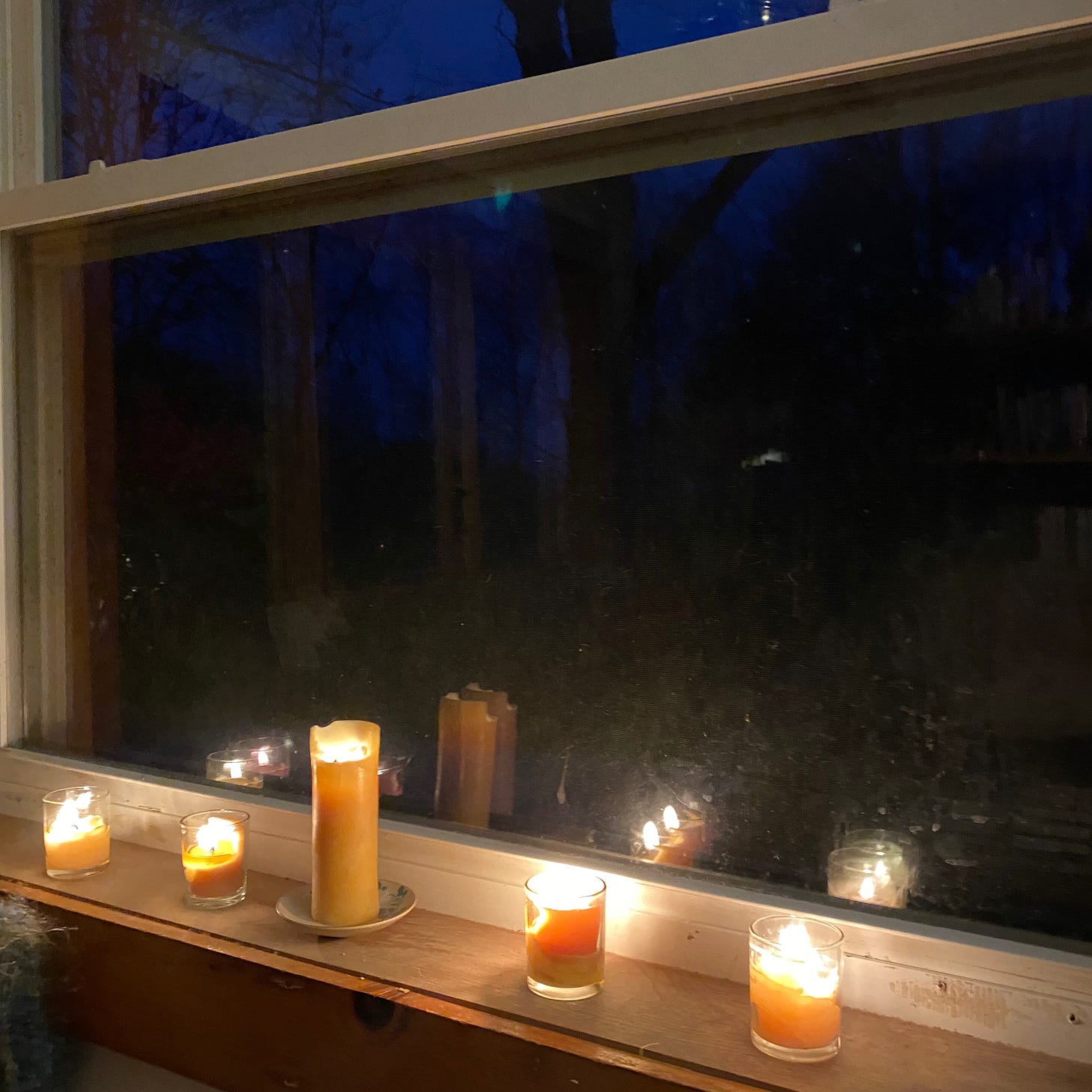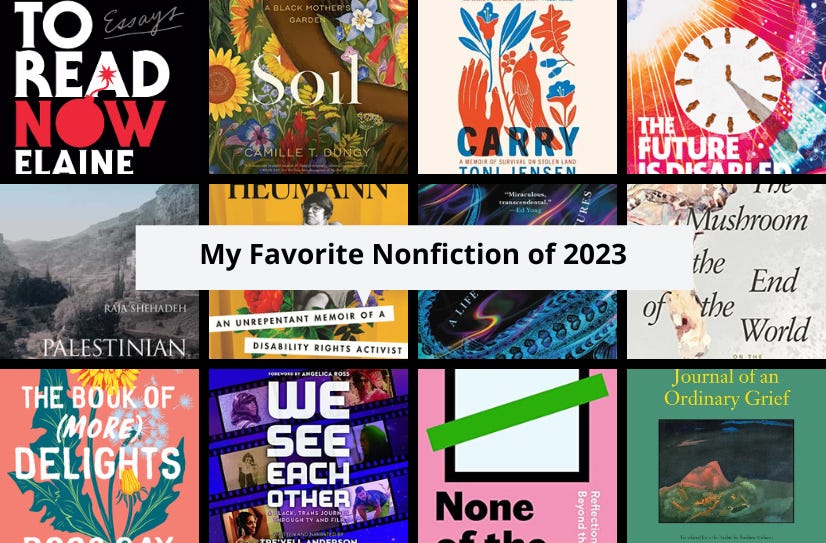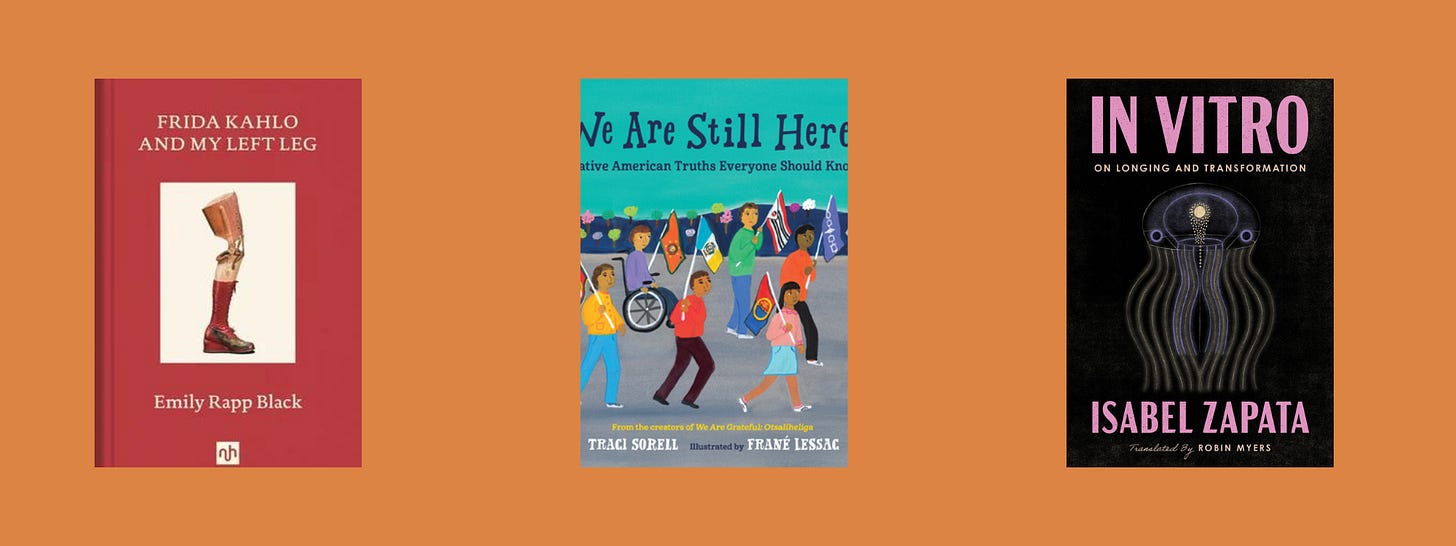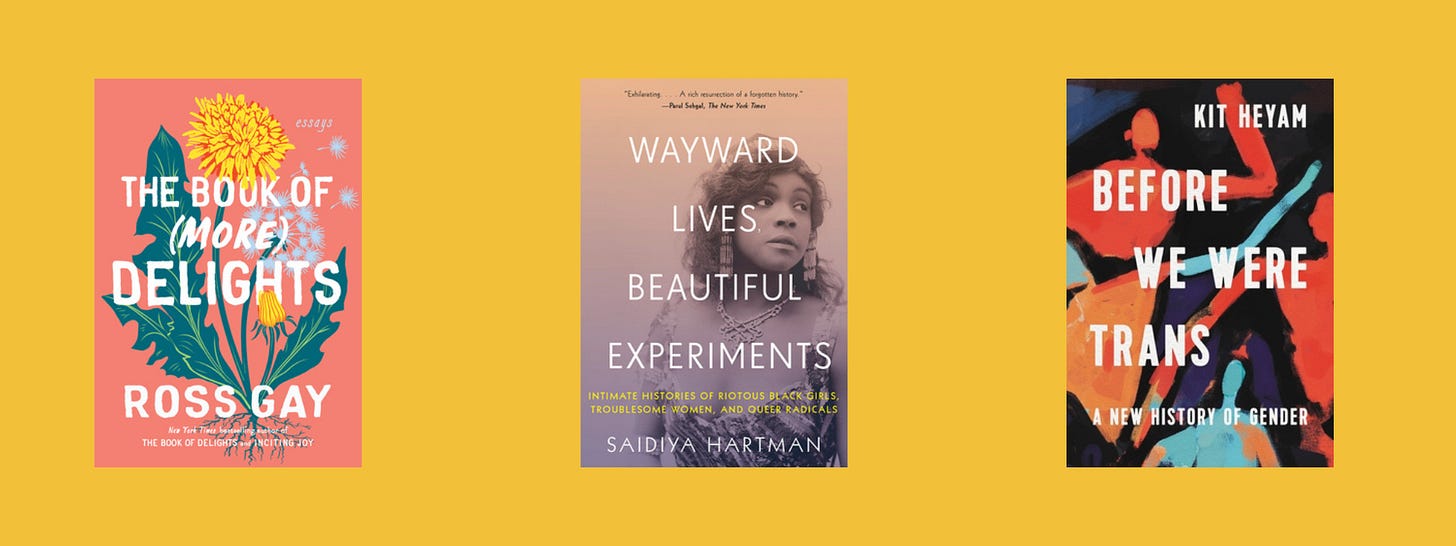Greetings, book and treat people. I don’t have a lot of words for you today. Fatimah Asghar has been writing about Palestinian films in their newsletter recently. Their writing is so good and clear. I’m looking forward to checking out the films. I appreciated Ijeoma Oluo’s newsletter this week as well. Nicole Manganelli of Radical Emprints is offering beautiful ‘Permanent Ceasefire Now’ postcards for the cost of shipping to folks in the US. Get a bunch and send them to your reps. I needed these words on queer and Jewish grief and Palestinian liberation from Rabbi Elliot Kukla.
I have been getting up before the sun rises to light candles and read by lamplight. It’s a practice: of grief, stillness, gratitude.
I read a lot of incredible nonfiction this year. Here it is!
My Favorite Nonfiction of 2023
Some notes on the list:
It includes the best nonfiction I read in 2023, not just books published in 2023.
It’s organized by moods and themes.
It includes 40 books, because…you know why, right?
You can browse through all the books via this handy list on Bookshop.
An asterisk indicates books I loved on audio.
Clicking on a title will bring you to Bookshop. Clicking on linked text in the description will bring you to my review (either in the newsletter or on Instagram).
It’s only December 8th, so this list is not definitive. It also doesn’t include rereads. If it did, How to Write an Autobiographical Novel would be on it!
I Could Have Read These Books Forever
Inciting Joy by Ross Gay (2022): I could review this book by saying that I cried through most of it, and that, at the same time, my heart fell full to bursting with how much deliciousness and joy exists in the world and in my life. That’s it, I could end it there. Or I could go on to say that I have never cared about basketball, but Ross Gay turns basketball into poetry and music and companionship and creativity…
How Far the Light Reaches by Sabrina Imbler (2023): Here are essays about the ocean and about queerness and about Imbler’s family and relationships, their loves, the cities they’ve called home, their cultural heritage, their gender. Here, in these incandescent essays that are a hundred shades of blue and green, Imbler explores the ocean as a sacred text. I would have happily read fifty more queer essays about sea creatures. Every single one broke me open, made me want to rush to the page with my own pen.
*Things I Have Withheld by Kei Miller (2021): This is a remarkable essay collection about many, many things: Jamaica, Caribbean writers, colonialism and tourism, queerness, Blackness, race and its many, many constructs, travel, poetry, many kinds of lineages, family. Mostly it is about silence—the things not said and why they’re not said, and why they matter—and bodies. Mostly it is about bodies. Mostly it is about how the world is made of bodies.
Complicated Love Notes to Complicated Places
Tar Hollow Trans by Stacy Jane Grover (2023): I loved this whole book about trans, queer, and Appalachian identity; rural America; and how we construct stories about ourselves and the places we come from. But the essay on barns blew it out of the water for me. I do have a review written that I’ll share at some point.
Light in Gaza edited by Jennifer Bing, Mike Merryman-Lotze, & Jehad Abusalim (2022): This is a brilliant collection, brilliant in its aliveness and variety. Gaza soars in these essays. The attention the authors give their home, their different ways of loving it, grieving for it, criticizing it, celebrating it, fighting for it—are spectacular
*Soil by Camille T. Dungy (2023): I used to be a farmer and I am still a gardener so this book spoke to my soul. But it is a brilliant collection of essays and poems about land and plants and everything they intersect with. So, everything. Dungy writes beautifully about parenthood, Black womanhood, nature writing and Black nature writing, squash, creatures, academia, all kinds of history, Colorado, poetry, rot, flowers. It’s a joy to follow the meandering pathways she travels.
A Small Place by Jamaica Kincaid (1988): If you live in a place with a tourist economy. If you have been to a place with a tourist economy. If you have ever gone anywhere as a tourist. Read this book. See also: anger and its uses. See also: anger as art-making.
Intergenerational Trans Wisdom
None of the Above by Travis Alabanza (2023): I don’t have enough words for how much I love this book. It’s a brilliant book and beautiful ode to living in an unfixed state, as well as a smart and scathing condemnation of the systemic injustices that are constantly trying to “fix” (so many layers of meaning here) people who do not “fit” (especially trans people of color and trans femmes). Please read it.
Trans Liberation by Leslie Feinberg (1998): One of my greatest reading joys this year has been listening to the words of queer and trans ancestors. Feinberg’s are wise and warm and so, so needed, still.
Miss Major Speaks by Toshio Meronek and Miss Major (2023): In these sparkling conversations, Miss Major shares her thoughts, feelings, experiences, lessons learned, delights, annoyances, and hopes with crackling honesty. She absolutely skewers white gay assimilationists. She gives no fucks about mainstream values and nonprofit bullshit. She has no patience for the corporate gay rights movement. She explains with deadly clarity where every last cop can go. She calmly destroys narrow binaries and ideas about gender with humor and much delight.
Short & Brilliant
In Vitro by by Isabel Zapata, tr. from the Spanish by Robin Myers (2023): This is a slim and beautiful book about motherhood, pregnancy, fertility, infertility, bodily transformation, change, grief, biology, love, monstrous health care systems, lineages of womanhood, making art, telling stories, memory.
We are Still Here! by Traci Sorell & Frané Lessac (2021): This is a wonderful picture book about Indigenous history and, most importantly, present. Children at a community school are preparing presentations for Indigenous Peoples’ Day. Each gets a two-page spread with straightforward text and bright, bold illustrations.
Frida Kahlo and My Left Leg by Emily Rapp Black (2021): Absolutely gorgeous. Devastating, wise, generous. This one took my breath away. I love nonfiction that feels like a messy pile of questions, arranged in a way that’s new and expansive, and that’s what this is—impossible questions, beautifully wondered.
It’s All About How We Take Care of Each Other
Falling Back in Love With Being Human by Kai Cheng Thom (2023): This is a collection of letters—they’re really prose poems—that are full of hope and longing, anger and forgiveness, exhaustion, all the messy intricacies of healing.
Taking Turns by MK Czerwiec (2021): This is an incredibly tender, thoughtful, and heartbreaking graphic memoir about the years Czerwiec spent as a nurse in HIV/AIDS Care Unit 371 at the Masonic Medical Center in Chicago. It’s a blend of her stories and the stories of patients she cared for and doctors she worked with. It’s full of so much humanness and so much messy care. I think it’s a book we all need right now.
Being Heumann by Judith Heumann (2021): This memoir taught me so much about disability history and illuminated so much about where we are now, 33 years after the signing of the ADA. Heumann’s life’s work is easily legible as activism: lawsuits, sit-ins, protests, the slow but steady shifting of public policy. These are all important tools, but they are not the only tools. One of the sweetest gifts of this memoir is that it’s also about how community-led movements can enrich and shape individual lives.
The Future is Disabled by Leah Lakshmi Piepzna-Samarasinha (2022): This book is a retangling, a brilliant and beautiful book of disabled wisdom. It made me think about so many things in complicated and often uncomfortable ways: grief, friendship, different kinds of communities, mutual aid, interdependence, art, home, joy.
Look Closely—Even Closer
Before We Were Trans by Kit Heyam (2022): In many ways this book is the anthem of my reading year: a book of complexities and nuances, past and present, a book that goes beyond the emptiness of “we have always been here” to something murkier, and more fun, and harder: Who have we always been? How does who we are now change how we see and talk about who we used to be?
Wayward Lives, Beautiful Experiments by Saidiya Hartman (2020): This astonishing world-opening book is easily the best history I have ever read.
*The Book of (More) Delights by Ross Gay (2023): This little book follows the same format as The Book of Delights—essayettes about moments, books, creatures, memories, observations, people, foods that bring Gay joy, written over the course of a year. As is his way, he meanders and tangles, his sentences climbing each other, getting all muddy and losing sight of where they started and where they’re going. I don’t know anyone else who writes like this so well.
Queer in Form / Formed Queerly
Dyke (geology) by Sabrina Imbler (2020): This is an essay/prose poem about geology and being a dyke. It's about the end of a relationship, and lesbian identity, and finding yourself in and losing yourself with and extracting yourself from another person. It's about queer time and geologic time, volcanoes and their memories, attraction and desire and touch, and the weird sacred connections between dykes and rocks, queerness and nature, queerness in nature.
Love and Money, Sex and Death by McKenzie Wark (2023): This is a slim memoir full of fluid aliveness. It’s a series of letters—to her mother, sister, various past lovers, a goddess, and her childhood self. These letters are intimate but they sprawl. Wark writes beautifully through change.
*Pageboy by Elliot Page (2023): Look, I just feel very tender toward and protective of this book. Also it’s very good.
Movement: Through/In/Of
Migritude by Shailja Patel (2010): This genre-bending book is a translation/expansion of Patel’s one-woman show of the same name. She traces her own history as a brown Kenyan of Indian descent, as well as the broader history of Indians in East Africa. The work traveses contents and languages and homes in a thousands ways, marking complex lines through memory, ocean, myth, political upheaval, genocide, letters, treasure
Migration: Incredible Animal Journeys by Mike Unwin & Jenni Desmond (2019): What a wonder of a book! Short paragraphs about various animal migrations accompany gorgeous illustrations. It includes creatures I’m familiar with, like monarch butterflies, humpback whales, arctic terns, and great white sharks. But I didn’t know emperor penguins migrate to the middle of Antarctica to breed! I had no idea there was a migrating dragonfly! I’d never heard of a sardine shoal (do yourself a favor and look it up) or of Christmas Island red crabs (ditto).
*Palestinian Walks by Raja Shehadeh (2008): This book is a love letter to and elegy for the Palestinian hills. It makes vivid what the occupation takes: lives, dignity, homes, land, the freedom to walk the hills in spring. The freedom to roam through a landscape of olive trees and iris, dramatic ridges and hidden valleys, ancient ruins, old family terraces. The freedom to move.
These Ones Just Go Together, Okay!
How to Read Now by Elaine Castillo (2022): This book woke up my brain. I didn’t think every essay was mind-and-world-opening, and that made me love it even more. It’s exciting to wrestle with books by writers I admire. The simplest (it’s so complicated) takeaway: reading is not just about books. Reading is how we see, enter, and understand the world. If you are a reader (a human), this book is for you.
*A Man of Two Faces by Viet Thanh Nguyen (2023): I listened to this on audio, but I’m keen to reread it in print, because Nguyen plays with formatting and structure in so many interesting ways. It’s some of the best writing on American complicity and global imperialism I’ve read in a while. Nguyen’s understanding and analysis of cycles of colonial violence is brilliant, by which I mean it’s eviscerating and visceral.
Journal of an Ordinary Grief by Mahmoud Darwish, tr. from the Arabic by Ibrahim Muhawi (1973, English translation 2010): I’ve been walking around with this book inside my body for weeks, and I still don’t know how to write about it. It is fierce and sharp and utterly clear. Darwish’s anger and pain ring high and piercing, a clamor of bells. He writes with utter conviction about Palestinian liberation and names the ongoing atrocities committed by the state of Israel and Zionist settlers with unwavering, unflinching rage.
Carry by Toni Jensen (2021): Oh, this book hurt. Hurt my heart, hurt my brain, hurt on my skin, hurt because it’s so beautiful, the sentences and the music and the stories, and it hurts, this beauty made of horror and violence.
Humor and Its Infinite Shapes & Uses
A Child in Palestine by Naji al-Ali (2009): Al-Ali was a famous and beloved Palestinian cartoonist whose work criticized Israel, the U.S., and various Arab regimes—anyone who contributed to the oppression of his people. This is a collection of cartoons published in various papers from the 1970s through the late 1980s. They don’t appear chronologically, which is such a brilliant and gutting way to present two decades of cartoons.
*We See Each Other by by Tre’vell Anderson (2023): This is a smart and funny exploration of the history of trans representation in film and TV. I generally find conversations about representation frustrating, boring, and lacking in nuance. This is not that. Anderson is not interested in representation for representation’s sake. They’re interested in what representation means and how it functions in society
A Pros and Cons List for Strong Feelings by Will Betke-Brunswick (2022): This is a playful and devastating memoir about Betke-Brunswick’s mother’s cancer diagnosis and death while they were in college. They draw all the characters as different kinds of birds and somehow it’s whimsical even though the subject matter is tough
Worth Slowing Down For
The Mushroom at the End of the World by Anna Lowenhaupt Tsing (2015): This is a fascinating, intricate, rangy, dense-but-beautiful book about matsutake mushrooms and the human and non-human ecosystems (natural, economic, social, cultural, historical, biological…) that surround them. It is about capitalism and living in it, with it, through it, and beyond it in complex ways.
*The Hundred Years' War on Palestine by Rashid Khalidi (2021): This is a brilliant and comprehensive history of Palestine from 1917-2017. There’s so much rigorous historical analysis about how Israel’s settler colonial project came to be (thanks to the UK and the US), 19th century Zionism and its stated violent colonial aims, and the dispossession of the Palestinian people (and outright denial of their existence) that has been going on for over a century. It’s chilling, enraging, and thorough.
The Transgender Issue by Shon Faye (2022): This is a direct and thoughtful book about trans life and liberation, specific to the UK but worthwhile for readers anywhere. Faye writes about the attacks trans people in the UK, U.S., and elsewhere are facing right now with searing fury. She writes generously and with compassion. Her arguments are nuanced, thoroughly researched, and interconnected. It’s a feat.
The Personal is Political (Always)
How Poetry Saved My Life by Amber Dawn (2013): I read this in early January and didn’t immediately toss it onto my best-of list. But I find myself thinking about it often. It’s a slim, powerful memoir about sex work, community tangles, queer grief, and finding a way through.
*Hijab Butch Blues by Lamya H: Sometimes you read a book and it cracks you open and remakes the world. Sometimes you read a book and it weaves a new song along your skin, echoes a buzzing note in your tender throat, opens longings you’d set aside years ago, upends you.
This Arab is Queer edited by Elias Jahshan (2022): This is a wonderful anthology of essays by queer Arab writers. It’s another one I wouldn’t have pegged for a slot on the Best Of list when I read it, but I find myself thinking about it often. Many of the essays are concerned with themes of multiplicity and wholeness. The whole book rejects simple binaries and invites in complexity instead, especially with regard to place, Arab cultures, migration, liberation movements, and family relationships.
Zami by Audre Lorde (1982): So much of this book is simply Lorde, living her life in various cities (mostly New York, but also cities in Mexico and Connecticut) as a young Black lesbian trying to figure out who she is and what she wants. This is what I loved the most. She is an icon, yes, and she left behind an incredible body of work (though, like all the work of all brilliant scholars, hers is not perfect or above reproach). She is a beloved queer Black ancestor and also she was just a human doing small human things.
Catch you next week, bookish friends. My excessively massive list of favorite fiction will hit your inboxes next Wednesday. In the meantime, I’d love to hear about your favorite nonfiction of the year!


















A lovely selection of nonfiction, thank you Laura. I love the way you break the subject down into tasty, bite-sized themes, with great titles too. My own 2023 choices are quite small... just three really interesting travel memoirs by women writers.
https://akennedysmith.substack.com/p/new-travel-memoirs-in-2023
Great compilation! I will definitely save it, thanks! ☺️